After its several Emmy and Golden Globe nominations and a proclivity for stanning Kirsten Dunst, I finally watched the second season of FX’s Fargo without any knowledge of either the first season (except for the first five minutes of the pilot which was all I could handle given my inability to focus) or the movie.
Spoiler alert for the second season of Fargo.
Blankly stating, it’s actually a very good show. Sure, it takes quite some time for things to “happen”—the pacing is not that good, and this was a real slow burn—but the payoff is amazing ,plot wise. In addition, the great surprise was the underlying feminist message the show has amidst sardonic humor, gore, and excellent performances by the ensemble cast and talented directors, writers, and cinematographers.
In general, I’d have to commend this show/season first and foremost for NOT using rape as a plot device. Even with a narrative set in 1979 and the clear danger of it happening, there was no sexual assault to be seen or heard or referenced! Seriously, this is such a low standard, but at this time and age, it’s not uncommon in television. It’s getting better, but really slowly.
Second, Fargo was not trying to be so subtle about the power women had in 1979: they were realistic about it (I think so. I wasn’t alive in 79). The show is a byproduct of today’s third wave feminism, but grounded on the second one as each of the main female characters had agency on their actions—the show was very character driven—and talked constantly about the role of a woman in that period and how the role would develop.
However, the show is not perfect in its treatment of women either, falling under a couple of tropes. Constance, the only gay character, was killed off in a “Leave No Witnesses” move. “Beauty is Never Tarnished” was heavy on the narrative when it came to the women who had lines/plots/arcs as they were not brutalized (a few were though, specially in the catalytic sequence of the season during the first episode). This is vibrant as you see that main characters Floyd, Simone, and Constance had incredibly less violent deaths than the male main characters. However, this is hardly a complaint of mine as much as it is a mention.
The main four women of Fargo—Simone, Floyd, Betsy, and Peggy—are distinct from each other (Floyd and Betsy shared some maternal qualities though). They were all developed, had their own arcs (in which they shared with the other characters, read: men), but all of them shared their views on feminism in several extents.
Simone Gerhardt
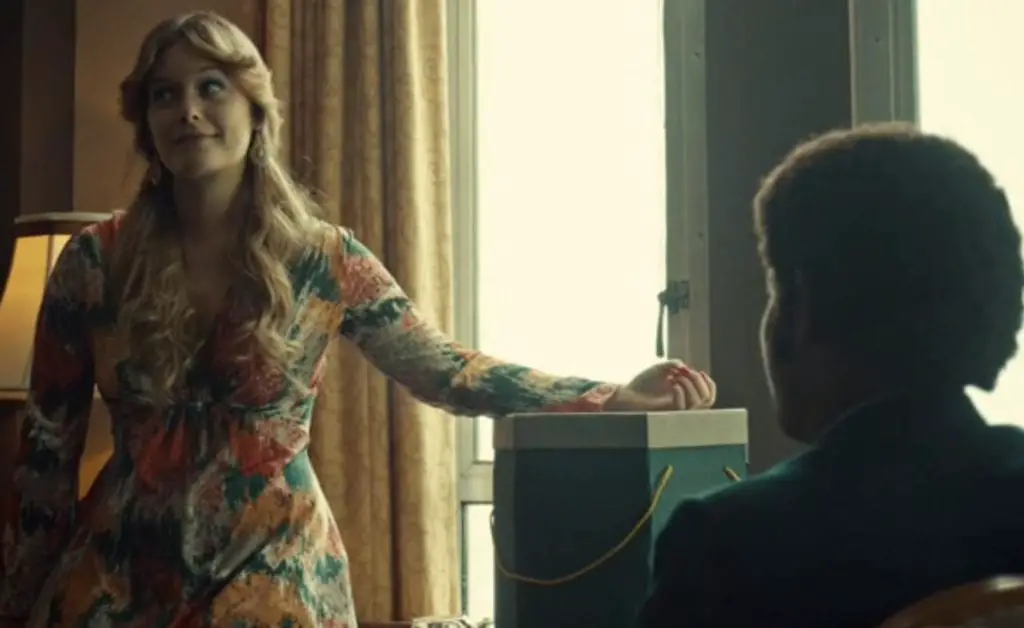
She was foremost a victim of being born a Gerhardt. Being the daughter of misogynist Dodd Gerhardt was clearly Simone’s main source of struggle as she wanted to be her own person. She was the “sexually liberated/in liberation” character of Fargo and craved for more agency. In the midst of the war brewing around her family, she decided to take charge and sleep with the enemy, Mike Milligan, and for that her uncle killed her.
The narrative doesn’t endorse the way she acted, but not like her father. While Dodd was clearly upset that he had had a daughter instead of a son and tried to control her every move, the narrative’s only disapproval of Simone was for betraying her family as she got hoisted by her own petard.
This was the cool part about Simone. She wasn’t another one of those “Father Knows Best” situations. The narrative didn’t slut-shame her nor put her in a pedestal of sexual manipulation/femme fatality. She was a flawed character who made a bad choice, but not a senseless one. Simone was trying to gain power —in fact, she was so desperate for a little bit of autonomy that she went to the lengths of lying with the enemy.
By the way, Dodd is simply a terrible character with no redeeming qualities and a hatred for women that is completely uncanny. I’d just like to point that out here because, unfortunately, his role is quite prominent.
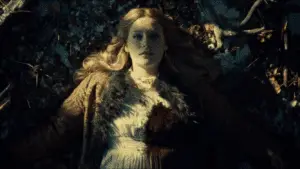
Later on in the season, we get to Simone’s death which wasn’t endorsed either. It was barely even pictured. We all knew what happened to her after her uncle Bear left her in the woods, but we were given a shot of her bleeding in the Dead Gerhardt Montage ™ in the last episode. If we’re being honest, in the moment, Bear was probably more hurt by his son being in jail than for Simone’s “treason”, but he “needed” reasons to kill her, so why not the fake-slut-shaming? Bear also knows that what he did was wrong as he didn’t tell his mom, Floyd.
Furthermore, Simone was one of the voices for the growing feminism of 1979. The main tagline was “women don’t need to be only wives and mothers no more”. She knew she could achieve more just as her grandmother. She got caught in the middle of a mafia war. As I said, Simone was a tragic case of being a Gerhardt woman.
Floyd Gerhardt
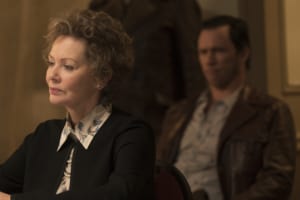
The character of Floyd Gerhardt was as much as a foil for her son, Dodd, as Simone was. The narrative pictured her as more than just a mobster’s wife: she was a competent mobster herself while being a tender and loving mother and grandmother. Floyd’s ways were more directed towards everlasting peace between mobs contrary to Dodd’s who ultimately incited the war that would culminate with all but one dead Gerhardts.
As much as Floyd had her tenderness, she also was tough when the situation demanded. Sure, it was all a miscommunication on Dodd’s part as he pursed his undertaking, but she had no remorse on wanting The Butcher dead for her son Rye’s death—aka the accident that propelled the season—and, likewise, had no issue with declaring war after her peace counter-proposal got shot down by Kansas City (which was also Dodd’s fault).
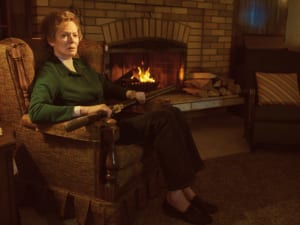
In the end, she was a victim of Hamzee’s betrayal during the heavy “The Castle” as she insisted she wanted to go herself to the motel in order to get the job done. I wouldn’t say her ending was earned or deserving to be honest. Like Simone, she was a victim of her time period despite having, certainly, fought bravely against the male dominated mafia business…a battle one might argue she ended up winning somehow.
Betsy Soulverson

I think it’s pretty usual for show watchers to find Betsy to be the person who solved Rye’s murder first—she did find his gun and was the first to even consider that his poor unfortunate soul had been faux-protaganisted out of existence by the de-facto-protagonist Peggy. Even if most of her scenes were shared with Lou and Hank, her own individual arc was battling her cancer.
We saw her take on the trial drugs (some theorists claim the UFO in Molly’s drawing saved Betsy there) as well as navigate the world where both her husband and father are cops, but it’s Betsy herself who is most likely to end up dead soon.
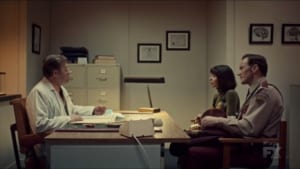 It was a fun and different way of seeing a character who wasn’t totally defined by her illness even if her arc was ultimately about that. True, we didn’t spend a LOT of time with Betsy, but we were able to see her kindness to strangers, her good relationship with the people around her, and also that little scene where she shows she is also handy with a shotgun. Her life may have been a routine, but she likes it. Her drives are family oriented, but this didn’t take from her individuality one bit. As much as she was the source of emotional support for her husband and her dad, she was much more than that.
It was a fun and different way of seeing a character who wasn’t totally defined by her illness even if her arc was ultimately about that. True, we didn’t spend a LOT of time with Betsy, but we were able to see her kindness to strangers, her good relationship with the people around her, and also that little scene where she shows she is also handy with a shotgun. Her life may have been a routine, but she likes it. Her drives are family oriented, but this didn’t take from her individuality one bit. As much as she was the source of emotional support for her husband and her dad, she was much more than that.
Peggy Blumquist
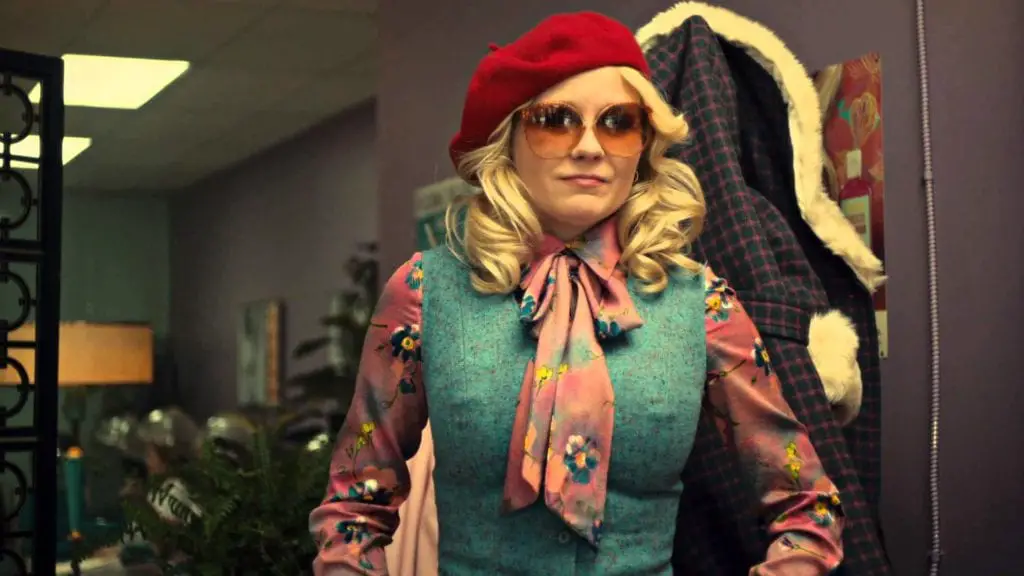
The last female character I want to talk about is Peggy, played by Kirsten Dunst, who has been praised for her role and nominated for several awards. As I said, she was one of the reasons I even wanted to watch this season (and by comparison, Mary Elizabeth Winsted is one of the main reasons I’m going to watch the next one), so I definitely had some high hopes for her. I wanted to check out what kind of story had taken the Kirsten I remembered from the Spider-Man trilogy to a Golden Globes and Emmy-nominee.
Forgive me for a little bit of diversion from the point, but usually, at least from the experience I got from keeping up with these awards, some of the female actors who get nominated for awards are usually the “badass/boss ass bitch/assertive/in position of power” types and that is perfectly fine. Just think about it. In her category in the Emmy Awards, Kirsten was competing against:
- Sarah Paulson, who played the assertive Marcia Clark in the AMAZING The People v OJ Simpson, where she showed all the power the character had despite being the aim of audience vitriol during the actual real life trial. It was no error that Sarah, upon winning, told Marcia that she is sorry for how she judged the former attorney.
- Felicity Huffman, who portrayed the assertive headmistress of the school where a male student was raped in American Crime. Her character was portrayed as not very sympathetic to the case as her main ambitions were about protecting the school’s interest against lawsuits and the media. However, as soon as it was proved that the sexual assault had indeed happened, she was one of the voices against the ‘men can’t get raped’ trope within the show.
- Lili Taylor, also from American Crime, portrayed the mother of the student who was assaulted. She was a fierce woman, going against literally everyone to prove her son was telling the truth, talking him down when he shot a person, and went as far as to seek more “unconventional” ways to bring light to the issue.
And those are only the three ones I personally watched. She was also competing against Kerry Washington for her work as Anita Hall in Confirmation, and Audra McDonald as Billie Holiday on Lady Day Emerson’s Bar and Grill.
So, yes, I was half expecting Peggy to be an “assertive boss-ass-bitch” and I was surprised that, well, she wasn’t…at least not initially. She was portrayed in the first few episodes as an uneasy woman. A housewife dealing with banal and day to day things. She just happened to run over a man, got scared so she took him home, put him in a meat locker, and proceeded to go make dinner. Peggy doesn’t want to get caught, obviously. She didn’t have an Annalise Keating Scheme ™ hatched, locked, and loaded to act upon.
Her husband, Ed, who mostly just wanted a simple life—a contrast to Peggy’s big dreams—finished up the murder and put upon himself to take care of the body while Peggy just got back to her work and life. She wasn’t too phased by the murder, but she also wasn’t not giving a shit about it. Peggy was fresh because she got help. She didn’t bottle up. Her struggles were more against the police than lies within her inner circle.
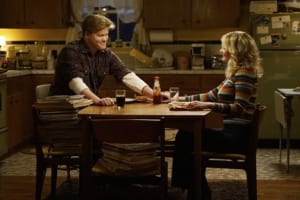
Peggy’s arc was more of a development one than any of the other characters—male or female—in Fargo (this probably comes with being one of the only ones alive by season’s end). Sure, she was the Cute and Psycho trope walking, but still. She aimed to being the best version of herself, collected beauty magazines because she needed the escape from her small town reality (highly relatable), she needed to go the Life Springs seminar to achieve her dreams of self-actualizing and improving herself. The murder was mostly just a catalyst; one has to wonder if she would have voiced her opinions about changing to Ed without it ever happening.
She made some critical decisions—contrivances, even, but they feel justified. She tried to run away from Luverne in order to go away, probably to the seminar, but stopped herself and sold her car because she realized that she couldn’t leave Ed behind with no prospects. It was a selfless decision that ultimately proved useless as Ed’s shop got burned down in his attempted murder, but it wasn’t a decision that the narrative condemned.
The character developed throughout the season as her “I can handle it” vibe only increased with each episode. She lied to Lou to his face about not killing Rye even when he was giving her every chance to confess and get protection. Peggy’s whole thing was “Ed and I can get through this together”. I think that it was only after episode 5 that Peggy finally ‘became’ what female characters are usually nominated for (the assertiveness and control) and it all started with her taking down Dodd with the taser (oh yeah, once again, we need to mix Dodd into this, ugh).
There’s also something noteworthy about Peggy’s plot armor: it was an ironic one because it’s kind of hard to pinpoint if she got out of any situation out of luck or competence. It may be more of a half-and-a-half situation and it may have something to do with Peggy’s mental state deteriorating with time. I’d say the only plot armor that was just mostly “the writers don’t want Peggy to die” was when she ‘just’ got slapped by Dodd.
Thus, everything just escalated after Peggy tased Dodd. She tied him up and fled the city upon having a quick actualization about herself. The idea was a realistic one: Peggy and Ed were going to trade Dodd for safety and so ensued “Loplop”, arguably the best episode of the season.
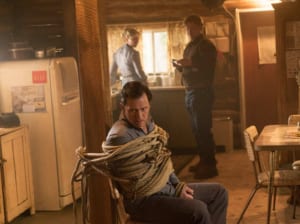 We, as the audience, were able to sympathize with Peggy even as she is “non-fataly-stabbing” Dodd to teach him some manners…it’s kind of hard not to, really. I mean, who feels sorry for the asshole who consistently assholed the whole season? And so she is, keeping her calm, blabbering about things like actualization and being the best version of Peggy which is actually quite interesting. She even fed him beans!
We, as the audience, were able to sympathize with Peggy even as she is “non-fataly-stabbing” Dodd to teach him some manners…it’s kind of hard not to, really. I mean, who feels sorry for the asshole who consistently assholed the whole season? And so she is, keeping her calm, blabbering about things like actualization and being the best version of Peggy which is actually quite interesting. She even fed him beans!
Later on, Dodd is able to release himself (let’s be frank here: the UFO is more realistic than Dodd getting free from that much rope) while Peggy is focused watching a movie. As soon as she realized Dodd is free, the scene is fortunately cut which I found nice because I wasn’t really in the mood to see her being beaten up and/or killed off by the Villain Sue.
We rejoin the cabin after some time. Peggy is lying on the floor after being allegedly the victim to Dodd’s “you will see the back of my hand” promise (again, I was particularly fond of this plot armor). Ed enters the house some time later and is immediately caught by Dodd who puts him in a noose strangling Ed. Peggy wakes up and manages to pick up a knife and stabs Dodd in his foot, binding him to the floor while she saves her husband.
And then, plot twist: Hamzee arrives and kills Dodd. A fearful Peggy gets surprised when Hamzee, who is having his own agency/betrayal plot on the side, asks for a “professional haircut” which was just fucking sad. Like… dude…. It’s so unfair what is going on with you, buddy. Asking for a haircut because of being tired of racism. In any case, Lou and Hank shortly arrive, some bang bang/cut ensues and our favorite native American is again on the loose contrasting the Blumquists.
Just so we’re clear, from episodes in the spam of a few episodes, Peggy has:
- Tased Dodd several times
- Stabbed Dodd twice on the chest – superficially – to teach him manners
- Stabbed Dodd on the foot
- Hammered something on Dodd’s head
- Saved Ed from strangling
- Stabbed Hamzee with a scissors
In “The Castle”, aka The Sioux Massacre Ensues, Peggy was the only person awake in her room which totally prevented the killing of both the Blumquists and that detective. She even hits said detective and incapacitates Hamzee briefly so she and Ed could escape (because, again, together is better). Peggy was also the only one who wasn’t phased by the UFO—some say that the sightings were a metaphor for feminism and the oncoming ‘female power’, so it makes sense that while all the men were taken aback by it, she just kept going forward.
She helps a wounded Ed escape Hamzee and locks themselves in the freezer of a supermarket. In there, she has her another instance of “mental instability” with a vision in which Hamzee was injecting smoke inside the freezer so they would exit it. However, this was just the way (probably?) her brain came up with to avoid dealing with a dying Ed. Even after she opens the doors, knife in hand, ready to kill someone and is stopped by Lou, she still thinks Ed is alive. Honestly…. Incredibly Fucking Heartbreaking. Kirsten aced it though.
 As the season closes, Peggy shares her last scene in an interesting and moving dialogue with Lou as she is being driven to prison. Both Lou and Peggy basically say the same thing: a long soliloquy about the burden of being either a male or female (in a binary gender system). Lou complains about how men are made to be this institution of protection, with the world and their families on their shoulder, but that’s a relatively good thing.
As the season closes, Peggy shares her last scene in an interesting and moving dialogue with Lou as she is being driven to prison. Both Lou and Peggy basically say the same thing: a long soliloquy about the burden of being either a male or female (in a binary gender system). Lou complains about how men are made to be this institution of protection, with the world and their families on their shoulder, but that’s a relatively good thing.
Peggy, on the other hand, complains about how society has these expectations for women—being wives and mothers first and foremost—but it’s also telling them that that’s not the only thing they can be, while at the same time, society offers no support so they can achieve those things: the day is simply not that long. It was a moving speech that was honest and crudely cut short by Lou saying “Peggy, people were murdered”.
Their sayings were just how women and men of 1979 reflected upon both how times were progressing, but they were also stuck in their times and locations. It was no wonder that Peggy was, even in her last minutes, thinking about going to jail in California. Minnesota is just too small. Lou was a family man by all rights and he knew that this limitation was wrong, but he was fine with it. It was his burden to bare and one he would do gladly. Peggy not so. As much as she loved Ed and wanted to support him, her dreams were just not meant to be ignored. From my understanding, she was way less eager to have a child with him, for example. She didn’t want to be planted in Luverne, but hardly knew how to leave.
In Conclusion
This was a show that depicted in an efficient way how sexism affects society. It’s clear on the treatment of the female characters, but if we’re being honest, every single male person from the Gerhardt family suffered from Toxic Masculinity…Dodd, mainly. He was the older son of Otto, who was compared to Hitler, so it’s fine to assume that the two of them had a close relationship albeit one that was probably not of the loving kind (one sided, maybe?).
We saw in one episode how Dodd potentially killed his first victim to save his father when he was still a child. We are talking about a man who was told his entire life that he was going to have his father’s empire to hold and his whole personality is a result of this: from his entitlement to his strawman misogyny. Dodd is a byproduct of living in a sexist society, a sexist environment, and mainly, the mafia which is, you guessed, sexist giving its literal patriarchy. Dodd was mainly just trying to emulate his father’s ways in dealing with people.
So, yeah. He was the character the audience was made to hate; it worked, Noah Hawley, because I despised him. His attributes and heart were in the wrong place. In terms of his death, it wasn’t particularly related to his misogyny. Instead, he got hoisted by another one the society’s many petards: institutionalized racism against Native Americans. As much as I would have loved to see Peggy or Simone have some agency into killing Dodd (true, Simone tried), I believe it was fitting for the narrative that neither succeeded.
Fargo also managed to not sexualize its women too much. Simone, the more “liberated” of the bunch, had her semi nude scenes where her hair covered her breasts and that was mostly it. The one sex scene between Peggy and Ed was sort of shot from another room being rendered completely non-sexual. Finally, Constance was shown to have romantic interest in Peggy which never moved forward.
In the end, Fargo surprised me big time. Despite the poor pacing of the first couple of episodes, I think the show is highly rewatchable once you already know names and plot. The cinematography is superb and the writing is amazing. Sure, we get some lines every now and again that are weird – like that time the female cop talked about pissing in a sink -, but in a world where Game of Thrones wins Emmys for writings, the standards can’t be that high, right? Plus, Fargo is sardonic by its nature as it doesn’t try to take itself so seriously and that’s how it should be. Fargo shouldn’t change because it is doing things right.
On a final note, I have stated that, from my perspective, Fargo was a good example of picturing feminism. However, I am obviously not saying that Fargo is a paragon of feminism. Despite some talks of racism towards Mike Mulligan (African-American) and Hamzee (Native American), the women are all white, so there’s hardly any intersectionality and that’s one of the very few drawbacks from a generally incredible ten hours of television.

